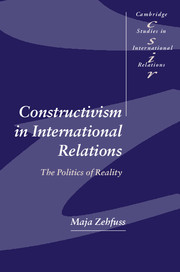Book contents
- Frontmatter
- Contents
- Acknowledgements
- List of abbreviations
- 1 Introduction
- 2 Identity change? Wendt's constructivism and German military involvement abroad
- 3 Intersubjectivity and the normative: Kratochwil's constructivism and German military involvement abroad
- 4 Words and world: Onuf's constructivism and German military involvement abroad
- 5 The politics of ‘reality’: Derrida's subversions, constructivism and German military involvement abroad
- 6 The politics of constructivism
- Bibliography
- Index
- CAMBRIDGE STUDIES IN INTERNATIONAL RELATIONS
1 - Introduction
Published online by Cambridge University Press: 22 September 2009
- Frontmatter
- Contents
- Acknowledgements
- List of abbreviations
- 1 Introduction
- 2 Identity change? Wendt's constructivism and German military involvement abroad
- 3 Intersubjectivity and the normative: Kratochwil's constructivism and German military involvement abroad
- 4 Words and world: Onuf's constructivism and German military involvement abroad
- 5 The politics of ‘reality’: Derrida's subversions, constructivism and German military involvement abroad
- 6 The politics of constructivism
- Bibliography
- Index
- CAMBRIDGE STUDIES IN INTERNATIONAL RELATIONS
Summary
Celebrated by some and dismissed or even regarded as dangerous by others, constructivism has acquired considerable significance in International Relations. Whilst judgements on the value and validity of constructivism differ widely, it seems all but impossible not to have an opinion. As a consequence, it is important to provide a critique that engages the claims of constructivism in detail. However, there is debate not only about whether constructivism is good for us but also, given the intellectual diversity of work labelled constructivist, about what it is in the first place. This poses a serious problem for the possibility of critique. This book focuses on the work of three key scholars; it does not aim to explore the whole range of constructivist work. And yet my critique is, I will argue, relevant to constructivism more broadly.
My critique works through careful readings of the work of Alexander Wendt, Friedrich Kratochwil and Nicholas Onuf, which are, in each case, related to the shift of the Federal Republic of Germany (FRG) towards using the military instrument in the international realm after the end of the Cold War. This allows me to offer a critique that is of relevance to experts in the area, but is at the same time accessible to those with only a passing familiarity with the matter at issue. In order to contextualise my argument, the introduction starts by visiting the literature on what constructivism is and why it matters.
- Type
- Chapter
- Information
- Constructivism in International RelationsThe Politics of Reality, pp. 1 - 37Publisher: Cambridge University PressPrint publication year: 2002

